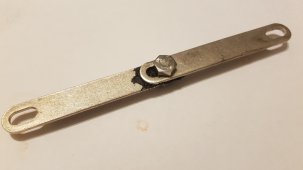I'm posting this as a response to a comment from Paul F. Note: mR == milliOhm.
Hypotheses I proposed: MG Chemicals 847 can lower the resistance in a connection between bus bar and battery terminal, especially in cases where limited torque can be exerted, or where the two connections are not completely flat.
Test procedure: Take two bus bars (plated copper) and join them together in one joint with a nut and bolt so that maximum overlap is achieved. Do this with a torque of 4Nm, and repeat this both with and without MG Chemicals applied at contact area on the same set of bus bars. Measure the resistance using a YR1035+ 4 wire meter, positioning the leads at the same location each test.
Resistance of individual bus bar, measured end to end between the holes: 0.06mR, therefor an ideal bus bar twice this size would have a resistance of 0.12mR.

Illustration: test set-up with MG Chemicals applied
Results:
Limitations: I do not have time to repeat this test with additional bus bars, material types, and connections at the moment.
Hypotheses I proposed: MG Chemicals 847 can lower the resistance in a connection between bus bar and battery terminal, especially in cases where limited torque can be exerted, or where the two connections are not completely flat.
Test procedure: Take two bus bars (plated copper) and join them together in one joint with a nut and bolt so that maximum overlap is achieved. Do this with a torque of 4Nm, and repeat this both with and without MG Chemicals applied at contact area on the same set of bus bars. Measure the resistance using a YR1035+ 4 wire meter, positioning the leads at the same location each test.
Resistance of individual bus bar, measured end to end between the holes: 0.06mR, therefor an ideal bus bar twice this size would have a resistance of 0.12mR.

Illustration: test set-up with MG Chemicals applied
Results:
- Without MG Chemicals: 0.22mR
- With MG Chemicals: 0.17mR
Limitations: I do not have time to repeat this test with additional bus bars, material types, and connections at the moment.
Last edited:


